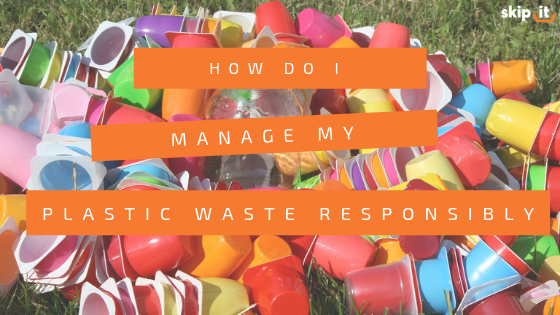The plastic waste crisis is a growing issue that requires more attention from the Government. With more plastic waste being produced than recycled, we are posing a major threat on our planet, as most of our waste plastic enters the oceans, harming animals, especially those such as seabirds. The plastic ends up in the sea, which are then swallowed by the birds.
Help Skip It take our first steps towards a cleaner and greener London by learning how to responsibly manage your plastic waste at home. Read on to discover how to tackle this issue and start with the smallest plastic waste found within your household today.
Plastic crisis in the UK
Plastic has many good uses. It can be transformed into all shapes and sizes, and you’ll find it everywhere you go; for example, it’s found in clothing, furniture, containers and children’s toys. However, the problem is that plastic isn’t biodegradable. This means it doesn’t rot, like paper and food waste, and instead, it’s able to persist in the environment for hundreds of years. And to make matters worse, we continue to produce ever-increasing amounts of plastic waste.
Did you know that in 2014, the UK produced 4.9 million tonnes of plastic waste alone, of which two-thirds were plastic packaging? Only 1.2 million tonnes of that waste were actually recycled. These shocking figures were included in the 2018 report by the World Wildlife Fund (WWF). The WWF also estimated that the plastic crisis in the UK has barely improved since their findings, with the UK recycling just under a third of its waste today.
With increasing public awareness of the plastic crisis, there is no doubt that the majority of UK residents are eager to recycle. So, the root of the problem rather lies in the fact that most people are estranged from their recycling options and what materials are recyclable.
That’s why we’ve gathered some tips and tricks that can help you manage your plastic waste responsibly.
Manage your plastic waste responsibly
Recycle as much as possible
- Empty and rinse all of your plastic bottles and containers before tossing them into the recycling bin
- Remove any plastic film and other bits of plastic from unrecyclable items, to recycle as much as possible
- Re-use plastic containers, including bottles, boxes and bags
- Donate your plastic items you don’t want which are still in good shape to fabric recycling facilities, schools and local homeless shelters
Reduce your plastic waste
- Avoid purchasing packaged items, such as food that come in plastic wrapping, as you tend to chuck them into the black bin straight after opening
- Bring reusable cloth bags with you when you’re shopping, instead of continuously buying plastic bags from the store – they only end up in the bin usually
- Electronic and hazardous waste can also contain plastic; however, such household items can’t be recycled, and often need to be disposed of at a hazardous waste facility
- Minimise your plastic bottles by using a reusable flask or bottle, and filtering your tap water
How Skip It can help
Here at Skip It, we are committed to recycling, keeping our environment clean and green. In fact, 95 per cent of all the waste we collect is recycled by our network of accredited recycling centres!
In order to manage your plastic waste responsibly, why not book one of our reliable services, so you can rest assured that your waste is being handled with great care. Hire a skip or book one of our House Clearance waste removal services, and our professional team will manage the plastic waste for you.
With our team of experts, Skip It can handle just about any type of waste. Feel free to get in touch to find out more about how to manage your plastic waste responsibly, and book one of our services today!







